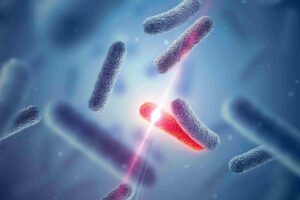What is already known
Inflammatory bowel diseases (IBDs) are a series of conditions characterized by gastrointestinal inflammation, often triggered by inappropriate immune responses to gut microbes in genetically susceptible individuals. Dietary changes associated with industrialization are increasingly recognized as additional factors associated with IBD, but what exactly triggers the condition remains unclear.
What this research adds
Researchers found that in IBD-prone mice that were fed a fiber-free diet, the gut microbiota exacerbated the degradation of colonic mucus, ultimately leading to fatal colitis. The inflammatory cascade starts with immune alterations followed by an excessive immune response triggered by the activity of mucin-degrading bacteria. A dietary formula low in fiber also induced mucus degradation but it inhibited inflammation — likely because it increased the levels of the anti-inflammatory bacterial metabolite isobutyrate.
Conclusions
The results suggest that certain dietary changes can counteract bacterial functions that promote disease. The findings thus underscore the importance of examining microbial functions to understand IBDs.
The rise in the incidence of inflammatory bowel disease (IBD) in industrialized countries is attributed to dietary changes, including reduced fiber intake and increased consumption of processed foods. Now, researchers have found that specific microbial functions may influence the development of IBD.
The findings, published in Cell Host & Microbe, also suggest that certain dietary changes can counteract bacterial functions that promote disease. The work, the authors say, “emphasizes the significance of examining microbial functions rather than taxa in understanding inflammatory bowel diseases.”
IBDs are a series of conditions characterized by gastrointestinal inflammation, often triggered by inappropriate immune responses to gut microbes in genetically susceptible individuals. Dietary changes associated with industrialization are increasingly recognized as additional factors associated with IBD, but what exactly triggers the condition remains unclear.
Gabriel Vasconcelos Pereira at the University of Michigan Medical School in Ann Arbor and his colleagues previously found that colonizing germ-free mice with 14 species of human gut bacteria results in the degradation of colonic mucus and increased susceptibility to the pathogen Citrobacter rodentium in animals fed a fiber-free diet. This time around, the researchers set out to study how the interplay between a fiber-free diet and the gut microbiota may exacerbate gastrointestinal inflammation in mice that are genetically susceptible to IBD.
Mucus degradation
When fed a fiber-free diet, IBD-prone mice showed a shift in the bacterial composition of their gut microbiota, with decreased levels of fiber-degrading microbes, including Bacteroides ovatus and Eubacterium rectale, and increased abundance of two mucin degraders — Akkermansia muciniphila and Bacteroides caccae. Wild-type mice fed a fiber-free diet also showed similar trends.
In IBD-prone mice, the gut microbiota exacerbated the degradation of colonic mucus, ultimately leading to fatal colitis, the researchers found. However, feeding mice dietary fiber inhibited inflammation.
Colonizing IBD-prone mice with a synthetic microbiota lacking mucin-degrading bacteria also reduced gut inflammation, resulting in improved survival. These results suggest that mucin-degrading bacteria contribute to inflammation.
Further experiments showed that the inflammatory cascade starts with immune alterations followed by an excessive immune response triggered by the activity of mucin-degrading bacteria.
Anti-inflammatory metabolites
The fiber-free diet shares similarities with certain liquid formulas low in fiber content that are used to treat some IBDs in humans. Despite their effectiveness in inducing remission, the precise mechanisms underlying these formula diets remain unclear.
To determine the effects of such a diet on IBD-prone mice, the researchers fed it to mice pups. The low-fiber diet induced mucus degradation but inhibited inflammation — likely because it increased the levels of the anti-inflammatory bacterial metabolite isobutyrate, the researchers found.
“If one considers the effects of the microbiome on IBD development to be a cumulative series of positive and negative stimuli caused by the particular behaviors and metabolites exhibited by the microbes, it should be possible to optimize beneficial processes (e.g., butyrate and isobutyrate) while reducing detrimental events like mucus erosion,” the authors say.











